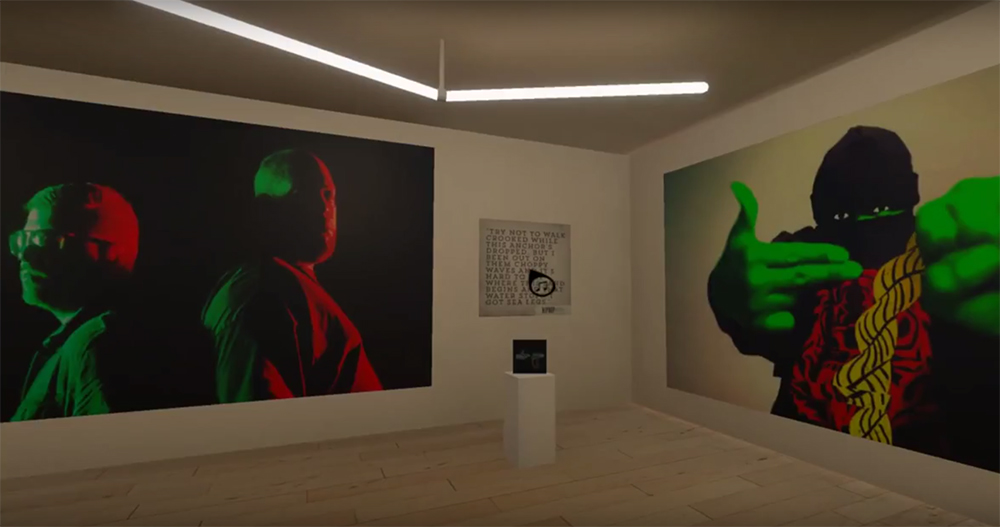
The Four Four Beat Labs is a digital pedagogies incubator located in the School of LMC. It houses the HipHop2020 Maker Space, which is the developer of the HipHop2020 Curriculum Project or simply HipHop2020.
HipHop2020 is an interactive, hip-hop-inspired digital archive that guides users through a series of “storied spaces” representative of hip hop’s cultural impact, its transglobal sociopolitical influence, its canonical contributions to Black media studies, and its pedagogical sensibilities in K-12, post-secondary humanities instruction. We endeavor to intersect the design of play and design of pedagogy to enhance HipHop2020’s interactivity across multiple platforms (including personal computers, tablets, and mobile devices) and access points (including a website, WebGL, and VR).
To this aim, we currently have two design issues: narrative interactivity and database development, that is nuanced according to the three ways in which the archive is accessed: website, 3D immersion through desktop or tablet, and VR. The project will address these issues over the next year.
During the 2018-2019 cycle, the web platform was redesigned to host basic content about the lab and archive with particular focus on the documentation of the archive’s acquisition via oral history; the creation of the lab’s podcast studio “FourCast”, with access to seasons 1 and 2 of “Hacking Hip Hop”, a podcast series produced by students enrolled in LMC 3206, 3306, as well as LMC 3258. Its goal is to use the podcast platform to “Crack the codes of critical activism through culture, media, and hip hop. We also integrated a membership/subscription plug-in through our web platform to provide potential subscribers access to hip-hop-inspired curriculum projects that are aligned with 9-12 and post-secondary educational standards for humanities as well as computational media instruction. The web platform will also link to hip-hop-inspired pedagogical approaches used in LMC 4720/4730. Although we endeavored to launch the web platform in Fall 2018, we demo’d in Spring 2019 and will have a soft launch at the end of June 2019. We also expanded both the interactivity and data management infrastructure of the digital archive. During the last phase of development for the Unity environment, we integrated an API which allows us to expand the scope of information made available to users in the Unity archive environment. In order to meet new demands, we intend to start leveraging multiple Amazon Web Services (AWS). Through AWS, we have been able to host digitized archival artifacts and musical metadata, and make data available to HipHop2020 applications through a custom-built API and make files available through a Content Delivery Network (CDN). This data infrastructure will not only make archival content available to HipHop2020 applications, but we can also use it to expose select data externally to 3rd parties. 3 Through collaborations with two community partners, one working with the Cartoon Network and the other an independent UX designer, one of the projects biggest accomplishments that I look forward to continuing with these senior designers is the buildout of the web platform, which has use positioned to scale to a mobile application, along with the 3D environment and our custom data management system are the three main accomplishments this year. We are better positioned to advance the web platform to a mobile application. We are poised to also license our own API to 3rd parties.
-
Delacoudray, C., Newton, S.H., Alemdar, M., Grossman, S., Garrett, S., Freeman, J., Wilson, J., Barbot, H., Moore, R.A., “Your Voice is Power: Integrating Computing, Music, Entrepreneurship, and Social Justice Learning,” Proceedings of Research on Equity and Sustained Participation in Engineering, Computing, and Technology (RESPECT), Virtual Conference, May 23-27, 2021. (Extended Abstract & Poster)
-
HipHop2020 Innovation Archive. Michael Webster Collection. Preserving Hip Hop Culture, Atlanta GA. Google Arts & Culture.
-
Wilson, J. (March 2021). On the capabilities of hip hop-inspired design thinking: An annotated syllabus. In E. Navas, O. Gallagher and X. Burrough (Eds.), The handbook of remix studies and digital humanities. United Kingdom: Routledge.
